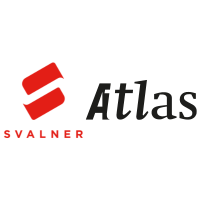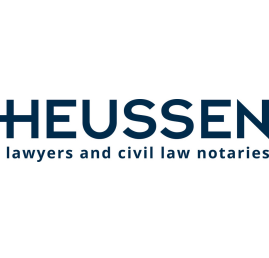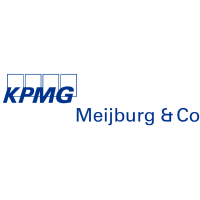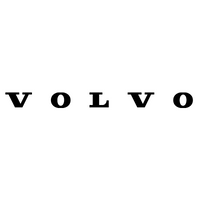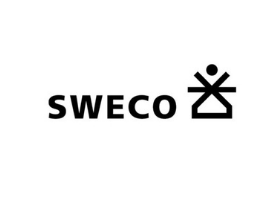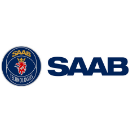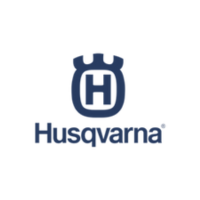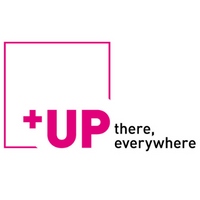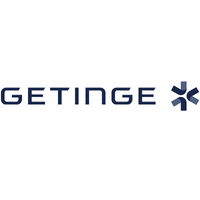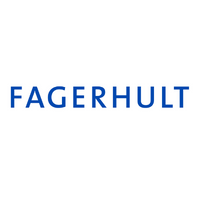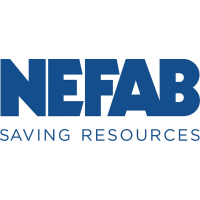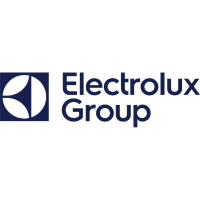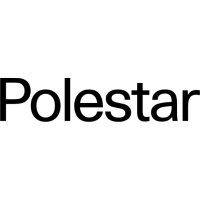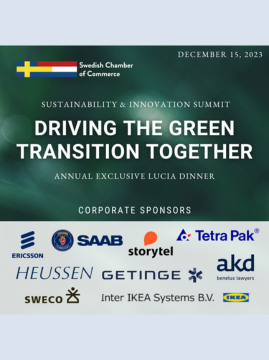
The corporate sponsors for the Sustainability & Innovation Summit
The Swedish Chamber of Commerce proudly presents the Corporate Sponsors for the Swedish Chamber of Commerce's premier annual event, "The Sustainability & Innovation Summit and Lucia Dinner 2023," set to take place on December 15 at the Hilton Hotel Amsterdam. The Chamber of Commerce cordially thank them all for their generous support which makes this event possible. Secure your table for the Exclusive Annual Lucia Dinner and become a corporate sponsor, which includes seats for the Sustainability & Innovation Summit. For more details about the program and bookings, .

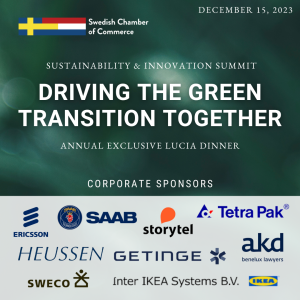
More
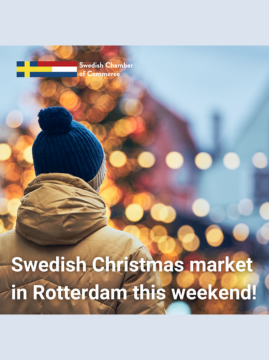
Swedish Christmas market in Rotterdam this weekend!
Mark your calendars for the Swedish Church in the Netherlands Christmas market that is taking place this Friday and Saturday in the International Scottish Church in Rotterdam. Explore a festive array of Swedish Christmas decorations, handicrafts, and delicacies, and enjoy a cup of classic Glögg!


More
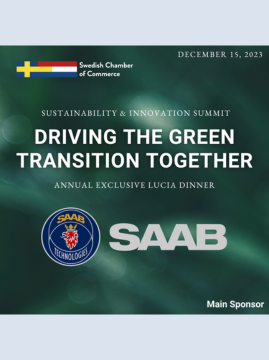
Saab, the main sponsor for the Sustainability & Innovation Summit
The Swedish Chamber of Commerce proudly presents Saab Netherlands as the main sponsor for the Swedish Chamber Sustainability & Innovation Summit “Driving the Green Transition Together” on December 15, 2023. At the Sustainable & Innovation Summit, you will meet businesses actively implementing substantial and impactful changes in their operations, observing the disruption of conventional business models. Collaboration between politicians, policymakers, and corporate entities creates an environment where innovative ideas emerge shaping the course of our future.
”An important element to reach our targets is R&D, which in the long run, is Saab’s most important contribution to sustainable development. Through industrial cooperation, transfer of technology, and university partnerships, Saab enables economic growth and industrial development. To give new ideas a chance we have created Saab’s Climate Fund, which promotes the development of sustainable innovations, tipping the scales for projects that otherwise may not be executed. The fund is allocated to environmentally conscious innovations ranging from improvements of existing products to the development of completely new products and services geared towards reduced climate impact. Innovation starts with a problem that requires a solution. This result-oriented approach has already led to multiple products with less environmental footprint than their alternatives” says Jan Terlouw, Country Manager of Saab Netherlands, and head of the Swedish Chamber of Commerce Sustainability Committee.
Following the Summit is the Swedish Chamber Flagship Event, the Annual Lucia Dinner takes place, a fantastic networking dinner including the Business Award Ceremony, Swedish entertainment, and a traditional Lucia Procession.
Read more about the event and book your seats .

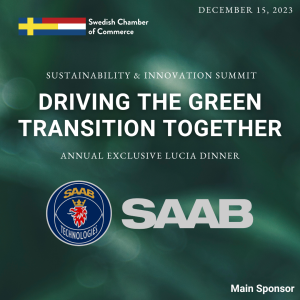
More
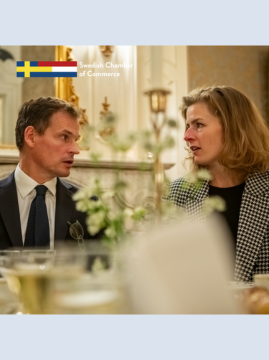
The Annual Patron Dinner at the Swedish Embassy
On November 16th, the Swedish Chamber of Commerce organised its most exclusive event, the annual Patron Dinner, at the Swedish Residence in The Hague. The Patron Dinner was hosted by H.E. Ambassador of Sweden, Mr. Johannes Oljelund. All guests were warmly welcomed by Johan Uhlin, Chairperson of the Swedish Chamber of Commerce and CEO of Scania Production Zwolle in the Netherlands. During the dinner, the Swedish Ambassador shared insights from his time in the Netherlands. Later, the journalist and author Charlotte Boström took the stage with a keynote speech where she provided valuable insights into gender equality and the labor market, comparing the Netherlands and Sweden.
A heartfelt thanks to the Ambassador for hosting the exquisite dinner, to Charlotte Boström for her insightful speech, and to all the esteemed Patrons who participated in the dinner, contributing to engaging discussions following the speeches. Explore the highlights from the Patron Dinner and view event photos .
Photo Credits: Hanne Hansen





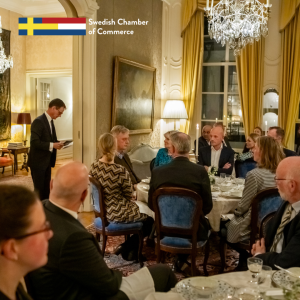


More

Upcoming events
Welcome to upcoming events at the Swedish Chamber!

- Join Academic Work for the to learn about what Young Talents look for in future employers and the top 25 most attractive employers in the Netherlands
- Sign up for the annual to celebrate one of Sweden’s coziest Christmas celebrations, located at PRLab’s inviting office in the heart of Amsterdam.
- Take part in the to gain thought leadership insights, learn about the latest innovations, and be inspired by the change-makers turning the green transition into reality. on December 15, 2023.
- Join the Swedish Chamber , following the Summit on December 15, for a festive evening of entertainment, live music, and dancing.

More
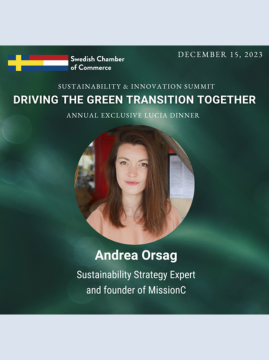
Andrea Orsag, Moderator for the Sustainability & Innovation Summit 2023
“We are way beyond stating that we need to start talking about it, beyond claiming that it is one company that needs to change, beyond blaming one specific industry. I want the summit to push things further and showcase how everything is connected.” - Andrea Orsag
We are very proud to present Andrea Orsag as the moderator for the Sustainability & Innovation Summit 2023 “Driving the Green Transition Together”. With her tireless passion for sustainability action and expert knowledge of sustainability strategies, Andrea will be facilitating the Summit’s conversation about the EU presidency's focus on the European sustainability agenda, fresh takeaways from COP28, and insights into how Swedish and Dutch companies are adapting their business models for green transitions.

- Save the date: December 15, 2023
- Discover more and secure your spot .

More
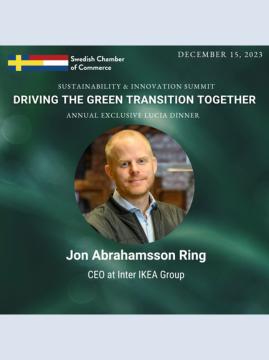
Jon Abrahamsson Ring, speaker for the Sustainability & Innovation Summit 2023
We are delighted to present Jon Abrahamsson Ring, CEO at Inter IKEA Group, as one of the esteemed panelist speakers for the upcoming Sustainability & Innovation Summit “Driving the Green Transition Together” on December 15, 2023. With over 20 years of experience at IKEA, including being Ingvar Kamprad’s assistant for four years, Jon will share his unique perspective on leadership in global businesses. Jon became CEO of Inter IKEA Group in 2020.

- Save the date: December 15, 2023
- Discover more and secure your spot .
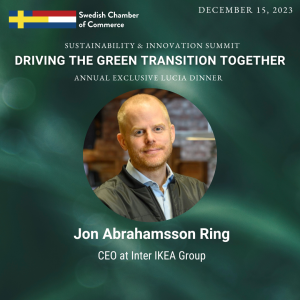
More

Revolutionizing Sustainable Transportation: Lynk & Co Takes the Lead in Car Sharing
The Swedish Chamber member Lynk & Co takes the lead in car sharing, as a part of their strive towards sustainable automobility. Read their of the exciting news from November 14, 2023.
"Revolutionizing Sustainable Transportation: Lynk & Co Takes the Lead in Car Sharing
To the mobility company Lynk & Co, car sharing is fundamental. While traditional automakers flood an already saturated market, Lynk & Co’s approach is simple and future-facing: Car Sharing.
In a society where the average car stands still 96 percent of the time, Lynk & Co has recognized the opportunity for change. Through Lynk & Co's award-winning app, they empower every 01 owner and subscriber to safely share their car with others and earn money in the process. The idea is that cars can and should be used more efficiently, increasing the access to mobility for all, without adding new vehicles to already congested urban spaces.

"Car sharing isn't just a service – it's about enabling mobility and committing to sustainability, says Alain Visser, CEO of Lynk & Co. It's our way of revolutionizing the very essence of car ownership, paving the way for a more sustainable and inclusive tomorrow, one ride at a time." Alain Visser CEO Lynk & CoSharing is deeply rooted in Lynk & Co’s DNA, and every 01 comes pre-equipped with integrated car-sharing technology. In every sense, they are built to be shared. Lynk & Co is committed to reshaping the landscape of car ownership, using its creative car-sharing program to drive the industry forward into a new era of mobility. Lynk & Co's Car-Sharing Community Booms with 1.5 million Hours of Shared Mobility Lynk & Co is dedicated to fostering a community centered around car sharing for the long-term. To ignite this community, it’s been crucial to develop an easy-to-use interface that provides incentives for lenders beyond just reducing carbon footprint. All bookings and transactions are simply and securely conducted through the user-friendly app, and all shared cars are fully insured by Lynk & Co. Since its launch, the interest in car sharing has steadily increased each year, leading to Lynk & Co's cars collectively being shared for a promising 1.5 million hours until October 2023 – truly transforming idle time into valuable shared mobility experiences. You Share, You Earn – shifting focus from the car to the people Sharing isn’t just about caring, it’s a money-maker too. In the last 12 months, Lynk & Co’s car lenders earned 850,000 Euros from sharing their cars. Each month, more and more Lynk & Co subscribers are now covering their monthly fees with money made from sharing – emphasizing that at Lynk & Co, the people steer the change, not just the cars. Lynk & Co Car Sharing in Europe– By the Numbers Lynk & Co cars have been collectively shared for over 1.5 million hours, and the total number of carsharings has exceeded 18,000. 16% of Lynk & Co’s B2C customers are actively using car sharing, with car bookings increasing by 136% in the last 12 months. In the last year alone, Lynk & Co’s car lenders earned 850,000 Euros from sharing their cars. The Netherlands is the leading market for car sharing, with an impressive 22% of car owners actively participating in vehicle sharing programs. The lenders are able to set their own hourly prices, with the lowest average price found in Sweden (9 Euros/hour) and the highest in Italy (30 Euros/hour)."
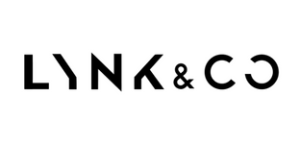
More







